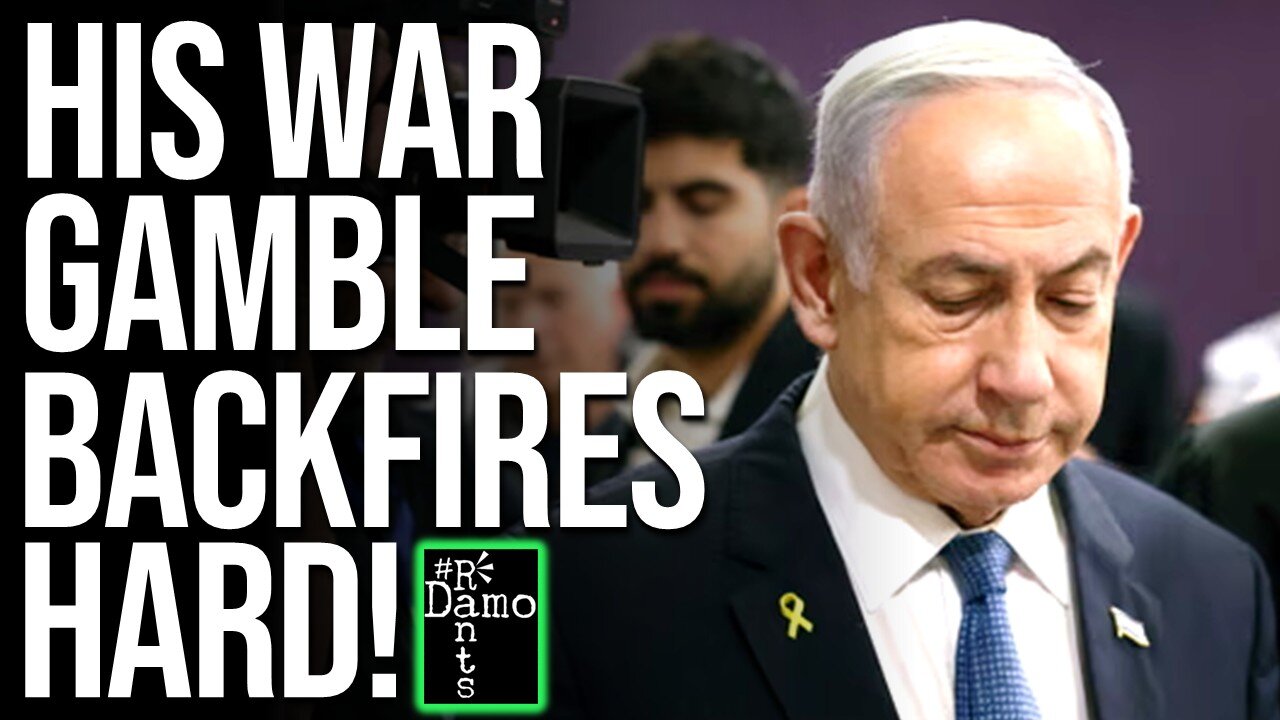Premium Only Content

Netanyahu Bets on War with Iran to Delay Trial – And Loses Big
Right, so Benjamin Netanyahu’s legal calendar has finally caught up with him — and he’s eyeing the military calendar like a man checking the weather report before deciding whether or not to leave the house. After years of postponements, adjournments, and miraculous bouts of illness whenever the witness box beckoned over his corruption trial, the Jerusalem District Court has ordered the prime minister to haul himself in three times a week from November. Yet just as the gavel comes down, Netanyahu’s sabre starts rattling again, you just can’t believe the coincidence can you? Gaza, Lebanon, Yemen, and, inevitably, Iran as if the surest defence against corruption charges is still a good offence. In Israel’s political playbook, no one has blended court avoidance and wartime bravado quite like Netanyahu has done, and the coming months, November especially, look very attractive to opening up yet another war front with somebody. Surely nobody still believes it’s all coincidence do they?
Right, so Benjamin Netanyahu has been on trial for corruption for nearly half a decade, yet he has never been closer to being compelled to face sustained, forensic cross-examination in court. Just this week, judges in the Jerusalem District Court issued a ruling that broke with years of slow-moving precedent, ordering that beginning in November he must testify three times a week as part of an intensified four-day weekly hearing schedule. But as the court sets this accelerated timetable, Netanyahu is also signalling a readiness to escalate multiple conflicts — including the possibility of fresh strikes on Iran — creating a collision between the legal calendar and the war calendar that could determine whether his trial ever reaches a verdict.
The symbolism of this shift is as important as the practical implications. For years, Netanyahu has controlled the pace of the proceedings, using a combination of legal manoeuvres, appeals on procedural grounds, health-related absences, and — perhaps most consequentially — national crises to keep himself from being pinned down in the witness box. The order to appear three times a week in November threatens to shatter that pattern. Yet, Netanyahu hasn’t dodged the courtroom for as long as he has by accident - he understands that the calendar of war can be just as malleable as the calendar of justice. The question hanging over Israel now is whether he intends to set one against the other, as if he hadn’t already been accused of doing so before.
The charges he faces — bribery, fraud, and breach of trust in three separate cases known as 1000, 2000, and 4000 — go to the heart of political integrity in Israel. Case 4000, the most serious, alleges that Netanyahu granted regulatory favours worth hundreds of millions of shekels to Shaul Elovitch, the controlling shareholder of Bezeq Telecom, in exchange for positive coverage on Elovitch’s Walla! News site. Case 1000 involves allegations of accepting lavish gifts, including cigars and champagne, from wealthy businessmen in return for favours. Case 2000 concerns an alleged deal with Arnon Mozes, publisher of Yedioth Ahronoth, to limit the circulation of rival daily Israel Hayom in exchange for favourable coverage. Each case carries the potential for a criminal conviction and prison time. When Netanyahu took the stand for the first time in December of last year, Wall Street Journal reporters described a tense, defensive performance that hinted at how damaging sustained cross-examination could be.
The slow pace of the trial up to now has been no accident either. Early on, Netanyahu’s legal team challenged the admissibility of key pieces of evidence, including recordings and witness statements, and argued over the order in which witnesses could be called. Each motion consumed weeks of court time. The judges agreed to hold hearings only twice a week, a schedule already light by international standards, and frequently allowed sessions to be cancelled for reasons ranging from the prime minister’s foreign travel to illness. As AP News has documented, some postponements were granted with less than 24 hours’ notice, such as when Netanyahu claimed food poisoning. In other instances, ongoing conflicts or national security emergencies were cited as reasons he could not be in court. Judges appeared reluctant to challenge these claims, wary of being seen as compromising Israel’s readiness in a crisis.
This dynamic — legal proceedings yielding to wartime imperatives — has recurred often enough to form a clear pattern. In May 2021, during Operation Guardian of the Walls in Gaza, the trial schedule collapsed, with hearings suspended for weeks. In October 2023, as the war with Hamas escalated into genocide in Gaza, courtroom activity again halted. In June of this year, Operation Rising Lion saw Israeli jets striking deep inside Iran, hitting nuclear facilities at Natanz, Fordow, and Isfahan. During that period, hearings were cancelled or shortened, with Netanyahu’s security obligations cited as the reason. The effect was always the same: the legal clock stopped ticking.
This record is why the November 2025 schedule matters so much. It represents the first serious attempt by the judiciary to end Netanyahu’s cycle of avoidance. But it also sets up a confrontation between the court’s timetable and the prime minister’s ability to create or exploit national emergencies. History suggests that when Netanyahu is cornered, war is rarely far behind.
The most obvious front for such a diversion is Iran. Netanyahu’s warnings about Iran’s nuclear programme date back more than three decades. In June 2025, Foreign Policy published a profile describing his obsession with Tehran’s atomic ambitions as a defining feature of his political career. That same month, Israel launched Operation Rising Lion, striking multiple nuclear sites. As Foreign Policy reported in a separate analysis, the timing was driven by a fleeting “intelligence window” — a unique alignment of operational readiness and intelligence on Iranian vulnerabilities.
Yet the rhetoric following the strikes suggested a mission far broader than the traditional goal of delaying uranium enrichment. A 13 June Foreign Policy piece argued that Operation Rising Lion was intended not just to slow Iran’s nuclear programme but to deliver a “death blow” to the Islamic Republic’s regional influence, targeting the entire Axis of Resistance. This shift from a finite, measurable military objective to an open-ended campaign of regime destabilisation has significant implications for Netanyahu’s trial. The former could be achieved or fail within months; the latter can be extended indefinitely, absorbing any number of skirmishes and proxy confrontations into its scope. It is, in political terms, the perfect umbrella under which to wage perpetual war — and to delay personal legal reckoning.
The risk of renewed escalation with Iran in the coming months is not hypothetical either. As Al Jazeera have reported, the UK, France, and Germany have set a late-August deadline to trigger the “snapback” of UN sanctions on Iran, a move that would almost certainly inflame tensions. Should that happen, Netanyahu would have both the diplomatic pretext and, arguably, the strategic incentive to act again. Any Israeli strike on Iranian assets, whether overt or covert, would certainly prompt retaliation. The result could be a multi-front emergency in precisely the September–November window when the court intends to accelerate Netanyahu’s testimony.
Beyond Iran, Netanyahu has been signalling ideological ambitions that could justify conflict on other fronts. Back On 12 August, as reported by The Times of Israel, he described himself as being on a “historic and spiritual mission” and said he was “very much” connected to the vision of Greater Israel. US non-profit outlet Truthout explained that this extremist concept includes territory far beyond Israel’s current borders, as this image illustrates, potentially incorporating parts of Jordan and Egypt, the whole of Lebanon, the bit of Syria they are currently fighting over you’ll note and beyond. The Arab League, Egypt, and Jordan condemned the remarks, accusing Netanyahu of expansionism. The New Arab detailed Egyptian outrage, warning of the strain on the Camp David peace treaty. Well perhaps Sisi should stop aiding and abetting Israel in their starvation of Gaza therefore. Such rhetoric is not only a rallying cry for his domestic base; it also frames conflict with neighbours as a fulfilment of historical destiny, making escalation more palatable to his supporters.
At the same time, Netanyahu’s government is advancing policies that could inflame other theatres. On 9 August it was reported that the cabinet has approved a plan to take over Gaza City, an operation that would entail intense urban combat and significant casualties. In the West Bank, Finance Minister Bezalel Smotrich has authorised new settlement expansion, telling Reuters this was intended to “bury” the idea of a Palestinian state. Each of these moves risks triggering violence that could be used to justify further delays to Netanyahu’s court appearances.
The confluence of these factors creates what might be called a collision course. On one side is the judiciary, seeking to enforce the principle that no one is above the law by compelling the prime minister to appear regularly in court. On the other side is a political leader with both the motive and the means to create circumstances that make such appearances impossible. The trial calendar and the war calendar are on a path to intersect in November, and the outcome will test not only Netanyahu’s personal fate but the resilience of Israel’s democratic institutions.
If Netanyahu once again manages to use war to avoid trial, the precedent will be devastating. It will confirm that the head of government can, in effect, veto judicial proceedings by manufacturing or prolonging national emergencies. This would erode the rule of law, embolden future leaders to follow suit, and distort Israel’s foreign policy by aligning military action with personal legal needs. For the judiciary, it would be a blow to credibility; for the public, a signal that accountability is negotiable when power is at stake.
The implications are not of course confined to Israel. As analyses of the Iran conflict have shown, military decisions made in Israel often draw in the United States and European allies. Supporting Israel in wartime is a longstanding policy for many of these governments, but doing so when the timing appears linked to a leader’s legal troubles risks complicity in undermining democratic norms. If foreign troops, ships, or aircraft are deployed in support of Israeli operations that serve primarily to delay a corruption trial, the damage to the credibility of those governments will be severe.
The months ahead will therefore be a test of multiple actors. The Israeli judiciary must decide whether it will hold firm to its November schedule even in the face of military escalation, which given the track record seems painfully likely. The opposition must decide whether it will challenge the conflation of national security with personal legal survival. The media must decide whether it will connect the dots between the trial calendar and the war calendar, or whether it will allow battlefield footage to eclipse courtroom scrutiny, because it just sells better. And Israel’s allies must decide whether they will enable or resist a strategy that puts perpetual conflict at the service of political immunity.
In the end, this is not simply about one man’s trial. It is about whether Israel can maintain a separation between the imperatives of justice and the temptations of wartime politics. Netanyahu has shown that he is willing to collapse that distinction when it serves him, and the stakes in November could not therefore be higher. If he turns to fresh conflict — whether in Gaza, Lebanon, or with Iran or whoever — to escape testifying three times a week, the damage will not be confined to the outcome of his corruption case. It will set a precedent that war can be weaponised against the rule of law itself, leaving the country, the region, and its allies to live with the consequences long after the verdict that never ends up coming.
Of course war is not the only way Israel can end up getting a beasting however, Iran certainly gave them that, but Norway are too and we don’t need to wait until November for that as they might be on the verge of dumping all $2 billion in Israel investments held by their oil fund and not before time, with a ruling due on that just next week. Get all the details oft hat story and the assets Norway have just dumped already in this video recommendation here as your suggested next watch.
Please do also hit like, share and subscribe if you haven’t done so already so as to ensure you don’t miss out on all new daily content as well as spreading the word and helping to support the channel at the same time which is very much appreciated, holding power to account for ordinary working class people and I will hopefully catch you on the next vid. Cheers folks.
-
 8:43
8:43
MattMorseTV
16 hours ago $21.08 earnedTrump CALLED Schumer’s BLUFF.
16.4K64 -
 LIVE
LIVE
Joe Donuts Live
2 hours ago🟢 Fast XP Farming in Fortnite? | DropZone Sunday
736 watching -
 LIVE
LIVE
Lofi Girl
3 years agolofi hip hop radio 📚 - beats to relax/study to
246 watching -
 LIVE
LIVE
B2ZGaming
5 hours agoPumped To Play!!! | B2Z Gaming
99 watching -
 3:01:28
3:01:28
PandaSub2000
19 hours agoDEATH BET w/MrMatthews + GAME BOY! (Edited Replay)
18K2 -
 LIVE
LIVE
Ashaelon
8 hours ago $0.04 earnedWelcome to the Harvest Zone
108 watching -
 18:07
18:07
Nikko Ortiz
1 day agoYou Laugh You Go To Hell...
92.1K20 -
 23:24
23:24
GritsGG
16 hours agoSpectating Solos! Most Winning Player Watches Random Solo Players!
9.97K1 -
 32:09
32:09
ThisIsDeLaCruz
2 days ago $9.85 earnedFalling In Reverse: Christian Thompson’s Stage Tech Revealed
62.3K12 -
 18:03
18:03
Nikko Ortiz
2 days agoEBT Meltdowns Are Insane...
64.4K149